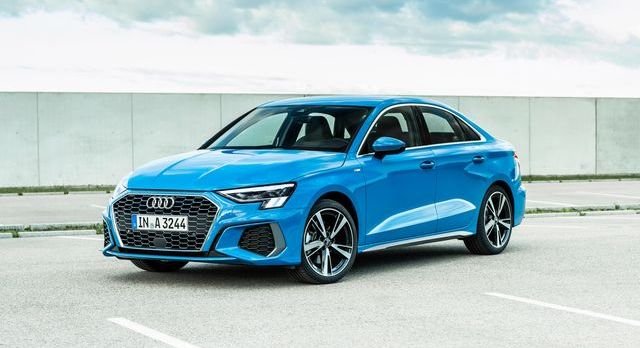Audi A3 to get electric successor on MEB platform by 2027

Audi will continue to use the VW Group's MEB platform for entry-level EVs, including an electric replacement for the Audi A3 by 2027.
The only Audi currently based on MEB is the mid-sized Audi Q4 E-tron crossover, and questions hung over whether the firm would continue to use the platform, given the new Audi Q6 E-tron spearheads a range of cars based on the new PPE structure, and the VW Group's new SSP platform will be in production by 2028.
But speaking to Autocar at the Munich motor show, Audi's technical development boss Oliver Hoffman revealed that Audi will use MEB "in the coming years, especially for 'A-segment' cars."
'A-segment', for Audi, refers to cars the size of the A3 hatchback and Q2 crossover.
No doubt the electric Audi A3 equivalent will use the heavily updated version of MEB, dubbed MEB-EVO, which is envisaged to serve as a bridging architecture to SSP.
This is set to support charging speeds of between 175kW and 200kW, but retain today's 400V hardware in a reflection of its entry-level billing, though further details remain under wraps at this stage.
Pressed for details on what Audi considers an entry-level EV, Hoffman said: "In the ICE world, our A-segment is A3, Q3 and Q2, and our Q4 E-tron is our so-called 'high-end' A-segment car in terms of its size. We have a clear view for our A-segment based on the MEB."
The firm has already confirmed it will not directly replace the A1 supermini and closely related Q2, so the electric A3 equivalent will be its smallest electric car. Under Audi's new naming strategy, whereby EVs are given even number designations and combustion cars given odd numbers, it could possibly be badged A2 E-tron, reviving a nameplate that hasn't been used for nearly two decades.
Asked how Audi can remain a premium brand while extending its electric line-up downwards, Hoffman said: "We have a clear strategy regarding this. We are in the decade of transformation; we have decided on a completely new generation of ICE and PHEV cars, and we will launch our last ICE/PHEV car in 2026.
"Starting in 2026, we will only launch BEV cars worldwide, and that means we will bring in all our core segments – A-segment up to D-segment [A8 and Q8] – battery-electric vehicles."
"But in parallel," he added, "especially in this decade of transformation, we will have ICE and PHEV cars in parallel" - suggesting the combustion-fuelled A3 can remain on sale in some form, alongside an electric equivalent, as is the plan for the A4, A6 and Q5.
Hoffman stopped short of giving a launch date, but emphasised that the next two years are the busiest period for new product launches in Audi's history, with nearly 20 new cars due in dealerships by this time in 2025.
At a conference last year, Hoffman said categorically that the new model will be"comparable to the A3."
Autocar was previously told that the A3 replacement has been conceived as a five-door hatchback and four-door saloon, both with incremental increases in dimensions. Those privy to early design proposals say Audi designers have taken full advantage of the packaging solutions offered by the dedicated electric vehicle platform, providing the A3 successor with altered proportions, including shorter overhangs, a shorter bonnet line, a longer cabin and larger wheelhouses.
Using the rear-driven MEB platform means standard versions of the A3 replacement will abandon front-wheel drive for the first time since the model’s introduction in 1996. The car, as with the current model it will replace, is expected to spawn more potent variants, such as the S3 and RS3 - no doubt with a second motor on the front axle for four-wheel drive.
As Audi goes EV-only, an electric RS3 will be the entry point into the newly electrified performance line-up. Audi Sport’s transition to an electrified portfolio kicked off with range-topping variants of the Audi E-tron SUV and Audi E-tron GT saloon, and it is expected to ultimately match the diversity and scope of its current performance range, which comprises highly strung versions of most Audi models.
Instant-torque electric power will enable any ‘RS3 E-tron’ to outpace the current five-cylinder petrol car in a straight line – so expect a sub-3.8sec 0-62mph time, and the innovative torque-vectoring functionality fitted to Audi’s existing fast EVs will no doubt trickle down to upcoming entrants to mimic the combustion car’s dynamic agility. It could also be the first of a new breed, with rivals BMW, Mercedes-Benz and Volkswagen yet to unwrap electrification plans for their own hottest hatchbacks.
